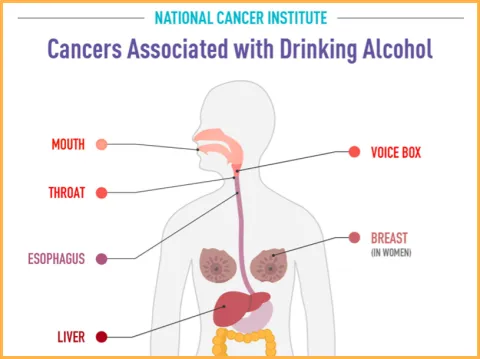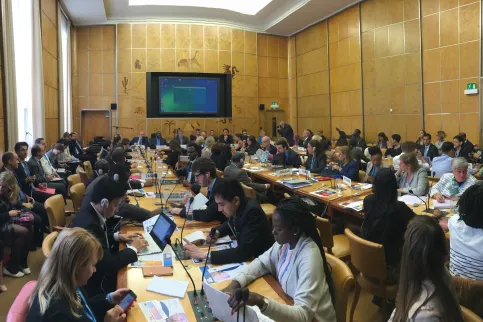Cancer and alcohol
Alcohol consumption is a major risk factor for multiple cancers. The risk of developing cancer increases substantially with the amount of alcohol consumed and there is no safe level of consumption when it comes to cancer.


Alcohol accounts for an estimated 741,300 (or 4%) of new cases of cancer worldwide and contributes to nearly 400,000 deaths due to cancer every year (The Lancet, 2021). The International Agency for Research on Cancer (IARC) has classified alcohol as a Group 1 carcinogen, indicating that there is convincing evidence to show that it can cause cancer in humans.
Indeed, alcohol consumption is a major risk factor for multiple cancers including oral, pharynx, larynx, oesophagus, liver, pancreas, colorectal and breast.
In January 2023, the World Health Organization stated in The Lancet Public Health that while the risk of developing cancer increases substantially with the amount of alcohol consumed, there is no threshold below which these substances or activities are safe. This is equally true, whether the alcohol is beer, wine or liquor.
In other words, even low levels of alcohol consumption have been linked to an increased risk of certain types of cancer, including breast, colorectal, liver, and upper digestive tract cancers: The latest data from WHO indicates that “half of all alcohol-attributable cancers in the WHO European Region are caused by ‘light’ and ‘moderate’ alcohol consumption – less than 1.5 litres of wine or less than 3.5 litres of beer or less than 450 millilitres of spirits per week.”
Governments can play an important role in reducing the consumption of alcohol and addressing the commercial determinants of health that drive consumption, e.g. containing the marketing tactics of companies selling alcohol. UICC therefore urges policymakers to take evidence-based action to reduce alcohol consumption and thereby help prevent a significant proportion of cancer cases.
WHO’s technical package for the SAFER initiative focuses on five key alcohol policy interventions that are based on accumulated evidence of their impact on population health and their cost-effectiveness. It is designed for government officials developing policy and action plans to reduce the harm done by alcohol.
WHO emphasises the importance of cost-effective interventions for harmful alcohol use, scientific information on alcohol use and dependence, and related health and social consequences.
The Global Strategy to Reduce the Harmful Use of Alcohol, agreed upon by WHO Member States in 2010, provides guidance for action at all levels, including 10 recommended target areas for policy options and interventions for national action to reduce the harmful use of alcohol. The most cost-effective actions to reduce the harmful use of alcohol include increasing taxes on alcoholic beverages, banning or restricting alcohol advertising, and restricting the availability of retailed alcohol.
The Global Information System on Alcohol and Health (GISAH) provides data on levels and patterns of alcohol consumption, alcohol-attributable health and social consequences, and policy responses. Reducing the harmful use of alcohol requires concerted action by countries, effective global governance, and engagement of relevant stakeholders.
To curb the harms associated with alcohol use, governments around the world have committed to reducing the consumption of alcohol by 10% by 2025 and 20% by 2030 (in comparison with 2010 levels). To achieve this, governments will need to adopt and implement a suite of effective, evidence-based policies and programmes to protect individuals, families and communities.
The policies and programmes currently prioritised by governments, however, are often not shaped by data alone. Public understanding and acceptability play a large role in what actions are taken, and industry actors have been active in trying to confuse discussions on the topic. This points to the need for more joint work between government, academia and cancer organisations to engage communities and implement evidence-based policies.
UICC supports WHO’s efforts to achieve a reduction in the harmful use of alcohol in line with the targets included in the SDG 2030 agenda. This requires concerted action by countries, effective global governance and appropriate engagement of all relevant stakeholders.
In particular, UICC is aligned with WHO's recommendations to reduce the consumption of alcohol and the burden of the harmful use of alcohol:
- regulating the marketing of alcoholic beverages (in particular to younger people);
-
regulating and restricting the availability of alcohol;
-
reducing demand through taxation and pricing mechanisms;
-
raising awareness of the health and social problems for individuals and society at large caused by the harmful use of alcohol;
-
ensuring support for effective alcohol policies;
-
providing accessible and affordable treatment for people with alcohol-use disorders; and
-
implementing screening and brief intervention programmes in health services for hazardous and harmful drinking.
UICC is working with its members to raise awareness about the risks of developing cancer associated with alcohol consumption. It organised a series of Virtual Dialogues with the Canadian Partnership Against Cancer looking at the evidence on cancer and alcohol and effective policies to reduce consumption.
UICC Advocacy Network

What is cancer control advocacy?

Advocacy impact

Cancer prevention

Last update
Wednesday 06 December 2023